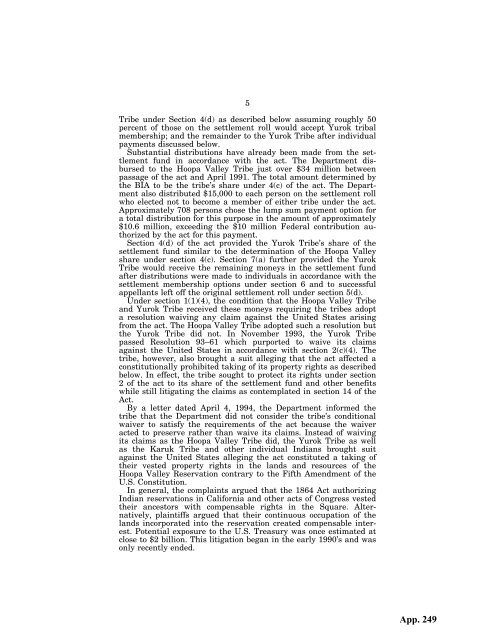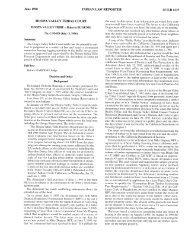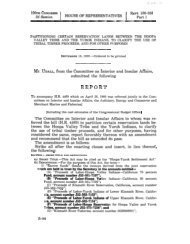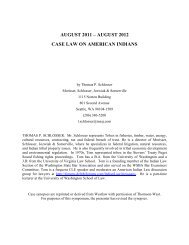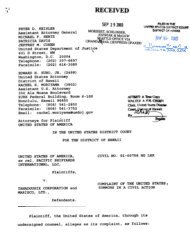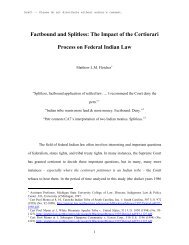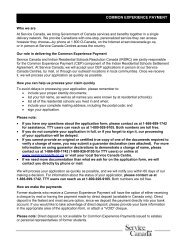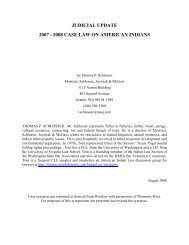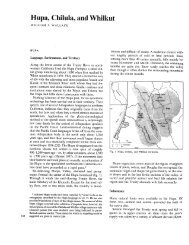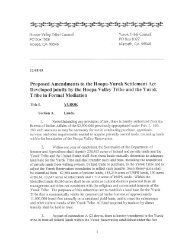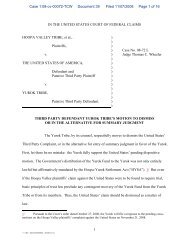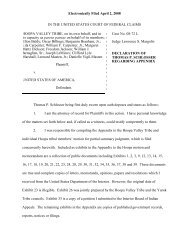Hoopa appendix supporting summary judgment - Schlosser Law Files
Hoopa appendix supporting summary judgment - Schlosser Law Files
Hoopa appendix supporting summary judgment - Schlosser Law Files
You also want an ePaper? Increase the reach of your titles
YUMPU automatically turns print PDFs into web optimized ePapers that Google loves.
5<br />
Tribe under Section 4(d) as described below assuming roughly 50<br />
percent of those on the settlement roll would accept Yurok tribal<br />
membership; and the remainder to the Yurok Tribe after individual<br />
payments discussed below.<br />
Substantial distributions have already been made from the settlement<br />
fund in accordance with the act. The Department disbursed<br />
to the <strong>Hoopa</strong> Valley Tribe just over $34 million between<br />
passage of the act and April 1991. The total amount determined by<br />
the BIA to be the tribe’s share under 4(c) of the act. The Department<br />
also distributed $15,000 to each person on the settlement roll<br />
who elected not to become a member of either tribe under the act.<br />
Approximately 708 persons chose the lump sum payment option for<br />
a total distribution for this purpose in the amount of approximately<br />
$10.6 million, exceeding the $10 million Federal contribution authorized<br />
by the act for this payment.<br />
Section 4(d) of the act provided the Yurok Tribe’s share of the<br />
settlement fund similar to the determination of the <strong>Hoopa</strong> Valley<br />
share under section 4(c). Section 7(a) further provided the Yurok<br />
Tribe would receive the remaining moneys in the settlement fund<br />
after distributions were made to individuals in accordance with the<br />
settlement membership options under section 6 and to successful<br />
appellants left off the original settlement roll under section 5(d).<br />
Under section 1(1)(4), the condition that the <strong>Hoopa</strong> Valley Tribe<br />
and Yurok Tribe received these moneys requiring the tribes adopt<br />
a resolution waiving any claim against the United States arising<br />
from the act. The <strong>Hoopa</strong> Valley Tribe adopted such a resolution but<br />
the Yurok Tribe did not. In November 1993, the Yurok Tribe<br />
passed Resolution 93–61 which purported to waive its claims<br />
against the United States in accordance with section 2(c)(4). The<br />
tribe, however, also brought a suit alleging that the act affected a<br />
constitutionally prohibited taking of its property rights as described<br />
below. In effect, the tribe sought to protect its rights under section<br />
2 of the act to its share of the settlement fund and other benefits<br />
while still litigating the claims as contemplated in section 14 of the<br />
Act.<br />
By a letter dated April 4, 1994, the Department informed the<br />
tribe that the Department did not consider the tribe’s conditional<br />
waiver to satisfy the requirements of the act because the waiver<br />
acted to preserve rather than waive its claims. Instead of waiving<br />
its claims as the <strong>Hoopa</strong> Valley Tribe did, the Yurok Tribe as well<br />
as the Karuk Tribe and other individual Indians brought suit<br />
against the United States alleging the act constituted a taking of<br />
their vested property rights in the lands and resources of the<br />
<strong>Hoopa</strong> Valley Reservation contrary to the Fifth Amendment of the<br />
U.S. Constitution.<br />
In general, the complaints argued that the 1864 Act authorizing<br />
Indian reservations in California and other acts of Congress vested<br />
their ancestors with compensable rights in the Square. Alternatively,<br />
plaintiffs argued that their continuous occupation of the<br />
lands incorporated into the reservation created compensable interest.<br />
Potential exposure to the U.S. Treasury was once estimated at<br />
close to $2 billion. This litigation began in the early 1990’s and was<br />
only recently ended.


